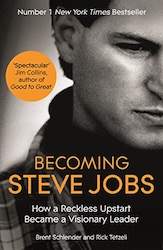Book Notes – Becoming Steve Jobs
A couple of highlights from Becoming Steve Jobs.

Sculley made clear that he would take the company in a more “market-driven” direction. Apple would now respond to the demands of its customers, instead of dictating to the market, as Steve had tried to do. Product decisions would be led by the sales and marketing teams, not the engineers. (p90)
…he made little progress in steering the group toward consensus. His one clear conclusion – “The delivery date is a line in the sand” – registered as what it turned out to be: an unattainable fiat. His team seemed smart, passionate, and intelligent; but it also seemed young, naive, unfocused, and in desperate need of a leader more decisive than Steve… For years, Jobs had been criticised by Scott, Sculley, Markkula, Woz, and others as being a divisive and impulsive manager who sowed chaos unnecessarily, delivered products late, gave unclear and shifting directions, and advanced his own ideas at the expense of the corporation. (p101-102)
Remember how he wanted the group at the first Pebble Beach offsite to decide on NeXT’s top priority: a great machine, on-time delivery, or a price tag under $3,000? It was the wrong question. NeXT absolutely needed to do all three things. But Steve couldn’t keep his company focused on what mattered when he couldn’t focus himself efficiently. (p105)
Creating a perfect cube with true sharp angles required expensive custom moulds… also insisted that the case be made from magnesium… Designing a computer laden with details like these made building it for $3,000 absolutely impossible. “The business plan… called for a cube whose material cost was fifty dollars, without the motherboard… The paint job alone cost fifty dollars.” … He added an unnecessary level of complexity, meaning yet more money spent for more engineers working more hours to accommodate a design that contributed nothing meaningful to the final product. (p110-111)
“I think that was one of the key changes when he went back to Apple. He was more open to the talent of others, to be inspired and challenged by that talent, but also to the idea of inspiring them to do amazing things he knew he couldn’t do himself.” (p173)
“But how can he be a turnaround expert… when he eats his lunch alone in his office, with food served to him on china that looks like it came from Versailles?” (p201)
“His decisiveness was so different than the crew that had been there… no sending things off to some marketing exec somewhere for approval, no vetting by some committee. In the old regime, you never knew who was making the decision. With Steve it was totally different. It was him and me.” (p219)
It was the first step of a leader who would now progress only in steps, not by leaps and bounds. “He was so focused… he was intense and both patient and impatient at the same time.” Steve had begun to move incrementally. (p221)
Collins believes this restlessness is far more important and powerful than simple ambition or raw intelligence. It is the foundation of resilience, and self motivation. It is fuelled by curiosity, the ache to build something meaningful, and a sense of purpose to make the most of one’s entire life. (p295)
“The narrative that was created around Steve 1.0 has dominated,” says Collins. “That’s partly because the story of a man who matured slowly into a seasoned leader is less interesting. Learning how to have disposable cash flow, and how to pick the right people, and growing, and rounding off the sharp edges, and not merely acting strange – that’s not as interesting! But all that personality stuff is just the packaging, the window dressing. What’s the truth of your ambition? Do you have the humility to continually grow, to learn from your failures and get back up? Are you utterly relentless for your cause, ferocious for your cause? Can you channel your intensity and intelligence and energy and talents and gifts and ideas outward into something that is bigger and more impactful than you are? That’s what great leadership is about.” (p324)